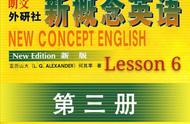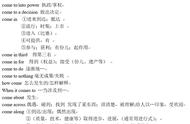在十大“魔鬼”动词中,最常见的不及物动词有两个,一个是 go,另一个是今天的主角 come;因为不能直接触及物体(不及物),所以在实际应用中需要借助介词作桥梁来桥接名词产生新的意思。
在英语中,能接在 come 后面的介词有:to,under,through 等,其中最常见的就是介词 to,如常见的固定搭配有:come to a standstill,come to an end,come to light 等,其中的 to 都是介词,例如:
Most industries came to a standstill after the outbreak of the COVID-19.
大多数工业在COVID-19爆发后停滞不前。
Who was behind the killing came to light.
谁是幕后凶手已经真相大白了。
The conflict between the two cultures has to come to an end.
这两种文化之间的冲突必须结束。

老生常谈,因为 come 是不及物动词,因此它后面不会直接出现名词,如 come 名词 介词,因此永远都是 come 介词 ( 名词)。
剩下的如 up,down 或 on 之类的小品词与 come 组合成固定搭配,也就是短语动词,因此具备了其他丰富多彩的意思,其中的 come on 的意思就达近十种,比你想象的要丰富。
一、come on,意为“别说了,停”等,用作口语中,相当于 stop it,例如:
Come on, leave me alone!
别说了,离我远点!
二、come on,意为“请同意我好吗”等,用作口语中,例如:
Come on, Mom, all of my friends have cars of their own. Can I just have my own car?
请同意我好吗,妈妈,我所有的朋友都有自己的车。我能拥有自己的车吗?

三、come on,意为“得了吧”等,表示知道某人说的话不正确,例如:
Oh, come on! You know that's not how it looks like.
哦,来吧!你知道事情不是这样的。
四、come on,意为“加把劲,赶快,加油”等,用于命令,例如:
Come on! I don't want to miss the opportunity.
快点!我不想错过这个机会。
五、come on to sb,意为“勾引,勾搭”等,想与其发生关系,例如:
I can't believe he came on to Jane. She's about to get married next month.
我不敢相信他竟然勾引简。她下个月就要结婚了。

六、come on to sb,意为“登台,出场”等,例如:
I don't think the band will come on tonight.
我想乐队今晚不会登台了。
七、come on/upon sth/sb,意为“偶然遇见,偶然发现”等,例如:
I came on an old friend in the bookstore today.
今天我在书店偶然遇到一位老朋友。
八、come on,意为“开始(疼痛),开始(犯病)”等,例如:
The pain began to come on again, and Nelson had to go to the doctor's.
疼痛又开始发作,纳尔逊不得不去看医生。

九、come on,意为“开始运转(或运行)”,例如:
It's chilly today. I hope the central heating comes on soon.
今天很冷。我希望中央供暖系统能很快启动。
像 come on 之类有几个意思的短语动词是一个非常正常的现象,又如 pick up 等;学会灵活掌握此类的短语动词,可以让拓展有限的词汇量,同时也会加深对小品词的理解。
关注外语行天下,后期会更精彩。
,













